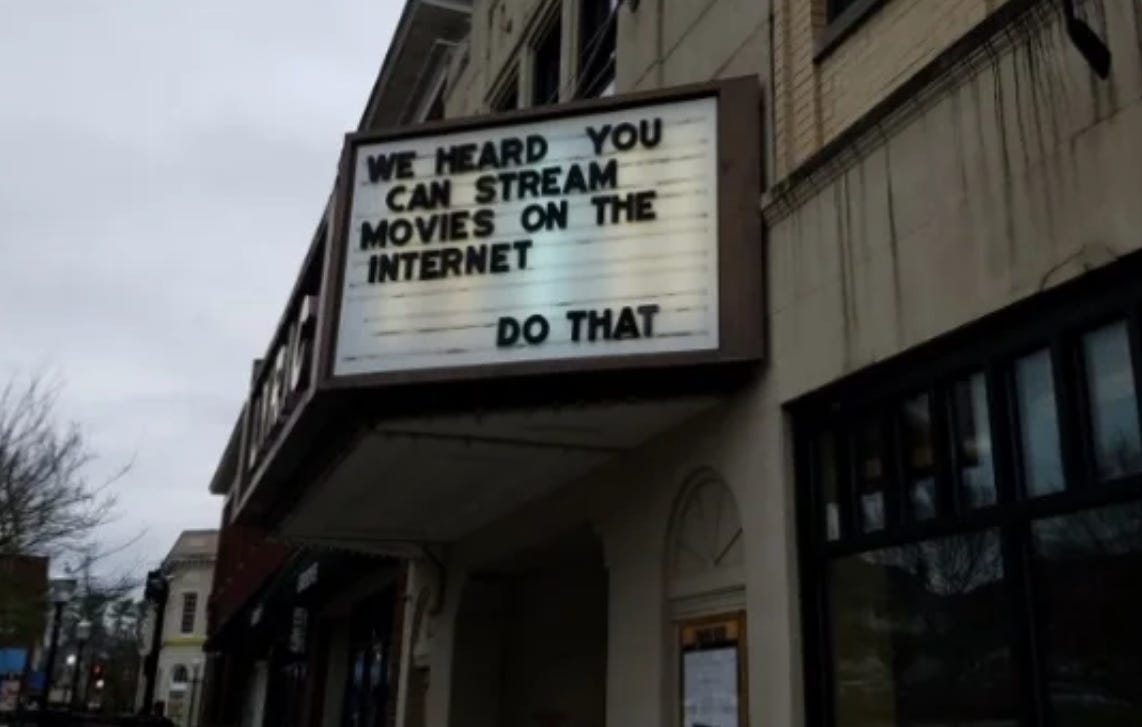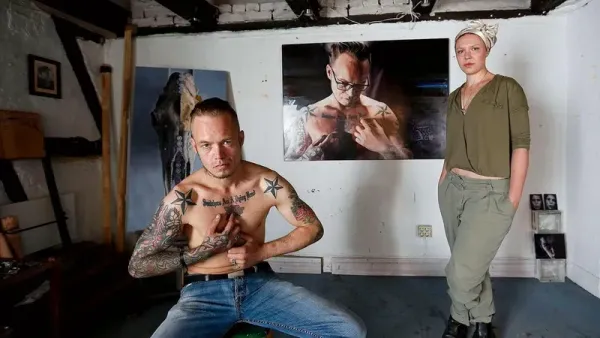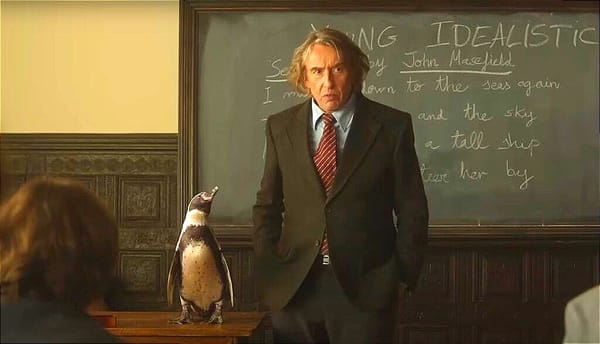The Best Movies of 2021
Here be the list, and it's a long one


How do you account for the fact that with everything going down right now – a global pandemic that taunts us with endless mutations, barbarians at the gates of the capital, America divided and in some quarters delusional, climate Armageddon at the door, an entertainment industry in corporate and technological upheaval, and audiences squirreled away at home with a remote and a list of bingeable TV shows – with all of that, it was a still a very good year for the movies?
That sounds inconsequential, I know, but it’s not. We look to our visual narratives to reflect and explain the world as often as they help us escape from it, and some of those reflections can take the form of poetry. Their cadences can be harsh or healing – sometimes both in the same film – or they can sidle up to the mysteries of being alive in a way that prompts insight or curiosity or joy. Or maybe we’re just grateful for movies that show people doing the hard work of being together when everything offscreen seems intent on keeping us apart.
Some people went back to the movie theaters this year, despite Delta. An October independent study of 2,500 people by the research group The Quorum found that a third of respondents had returned to pre-pandemic levels of moviegoing, while another third hadn’t been back since the start of COVID but hoped to return soon. (Then there were the “Likely Losts,” the 8 percent who said they weren’t going back to the movies ever.) That first group, the “Avids,” skewed white, male, urban, slightly Republican, and very much vaccinated: Nothing’s going to stop them from doing what they want. The “Hopefuls,” by contrast, leaned younger, female, and Democratic/Independent. Does that explain why Steven Spielberg’s remake of “West Side Story” supposedly under-performed in theaters or why “Spider-Man: No Way Home” pulled in the second-highest opening weekend in history even with the Omicron variant erupting across the country? (Call it the first superhero super-spreader event.) No, but it does suggest that whatever rules once applied to predicting a movie’s success are now meaningless.
Anyway, aren’t most of us staying home and watching TV shows instead? The two-hour film experience still has cultural clout, but it can be hard to fit it in between episodes of “Succession” and “Squid Game.” (And “The White Lotus” and “Nine Perfect Strangers.”) When the pandemic locked in at the beginning of 2020, the major studios and multiplexes shut down operations entirely, and the studios’ corporate parents used the hiatus to launch their dedicated streaming services: Disney+, HBO Max (Warner Bros.), Paramount+, The Peacock Network (NBCUniversal). The independent distributors and arthouse theaters kept alive, barely, through digital screenings. Two years later, the situation has reversed, with the new studio platforms streaming blockbusters the same day they appear in theaters, and independents like Focus Features, Neon, A24, and Searchlight once more sticking to the theatrical circuit before their movies appear on demand weeks and months later.
This, in part, is what prompted the decision to throw my life up in the air, quit my job at the Boston Globe, and start this newsletter. The traditional-media model for writing about movies no longer reflects the way people watch them, and it frustrated me to think that a film I was reviewing this week wouldn’t be seen by the majority of readers until a month or two later, by which point they wouldn’t have the guidance or context of whichever critic or pundit they cared to follow. There were two separate conversations about movie culture happening in two separate time frames; “Ty Burr’s Watch List” has been an attempt to bring those conversations back into synch as well as a way to find a path through the immense breadth and depth of streaming movie choices.
But a funny thing happened on the way to this forum: Unhooking myself and readers from the dominance of the theatrical release schedule — even slightly — has allowed all sort of wonders to float into view: Sleepers and classics from the past, yes, but also new and newly available films that push further into fresh realms of entertainment and experience. And when it came time for me to stand back and think about the best movies of the year, I found that a lot of the borders separating countries of origin and genres and varieties of screens were starting to dissolve. Some of the greatest films of 2021 never saw the light of a movie projector. There’s at least one that a lot of people don’t think of as a “movie” at all. (That would be the eight-hour documentary starring Paul, John, George, and Ringo.) But it is one. More than ever, definitions no longer serve to define.
I tend to resist Ten Best lists, always have. Any given movie year has more riches and diversity than can be stuffed into a box, and it’s a disservice to readers to say, “Here: These and only these.” One year at the Globe I pushed in vain for a Top Fourteen; another year, I made pairings of movies in a cheap (but successful!) bid for a Top 20. Now that I’m a free agent, I can do as I like, so here you’ll find not the Top Ten movies of 2021, but what are simply to me the year’s best films, along with where you can find them as of this writing. Once again, certain pairings have suggested themselves, so I’ve followed my instincts in the order in which I’ve ranked them. (That said, my first two movies are just that: My favorites.) If you must, you can draw a line after the first ten and stop there. But if you do, you’ll be cheating yourself of some the most marvelous and challenging visions 2021 had to offer.
1 & 2 “Wheel of Fortune and Fantasy” (in theaters) and “Drive My Car” (for purchase on Vudu in theaters) – Japan’s Ryûsuke Hamaguchi has been sneaking onto adventurous filmgoers’ radar for a few years now – his 2015 breakthrough, “Happy Hour” (now playing on the Criterion Channel) is a quiet five-hour epic about the lives of four women friends in their 30s – but the two movies he released in 2021 have raised him to the front rank of world directors. “Drive My Car” is the one winning all the critics’ association awards (including Boston’s), and it’s a masterpiece, a drama about a grieving theater actor (Hidetoshi Nishijima) staging a production of “Uncle Vanya” in Hiroshima and his driver (Tôko Miura), a young woman carrying her own sorrows. Freely based on a Haruki Murakami short story, it addresses a vast range of human emotions with a wisdom and compassion that can only be called Chekhovian. For all that, Hamaguchi’s other 2021 film, “Wheel of Fortune and Fantasy,” has stuck with me in even more elusively powerful ways. It’s a trilogy of short tales, each centering on a woman wrestling with issues of control, deception, coincidence, and regret – a spurned lover wondering whether to sabotage her ex’s new relationship, a student trying to honey-trap a professor and ensnaring herself instead, and an older woman returning to a high school reunion seeking a lost love and finding an evanescent new connection. Hamaguchi has the knack of illuminating his characters’ inner lives with a simplicity and depth that begs comparison with his acknowledged master, the great Yasujiro Ozu. His films can be hard to find – both “Drive” and “Wheel” should be available for streaming rental in 2022 – but they reward the effort with a cosmic, all-seeing clarity that comes to seem like mercy.
3 & 4 “Quo Vadis, Aida?” (streaming on Hulu and Kanopy, for rental elsewhere) and “Parallel Mothers” (in theaters starting 12/24) – Two movies that employ different genres, the suspense thriller and the melodrama, to cast light on their countries’ historic crimes. In the process, they deliver two of the year’s finest performances. In “Quo Vadis, Aida?,” Jasna Djuricic plays a Mother Courage of a Serbian translator trying to get her husband and sons out of Srebrenica before the genocide begins. In Pedro Almódovar’s “Parallel Mothers,” Penelope Cruz’s character comes to terms with a lie about her young daughter even as Spain struggles to come to terms with the murdered dead of the Franco era. Both films function as gripping “entertainments,” the better to exhume the secrets that politicians and other leaders would prefer to sweep under the rug.
5 & 6 “Summer of Soul (… or, When the Revolution Could Not Be Televised)” (Hulu) and “Get Back” (Disney+) — A pair of irresistible pop-culture reclamation projects, one long forgotten, the other long misunderstood. “Summer of Love” captures a 1969 Harlem music festival with supernova performances by Sly and the Family Stone, Nina Simone, Mahalia Jackson and Mavis Staples, and many more; as carried to the finish line by director Questlove (after many hands had had a go over the years), it’s a core sample of Black music and Black pride as they metamorphosed from Civil Rights-era resistance to post-MLK Jr. revolution. “Get Back” lets Peter Jackson get his Beatles freak on by diving into the footage of the contentious “Let It Be” sessions and surfacing with an eight-hour rebuke to Michael Lindsay-Hogg’s 1970 downer documentary. If “Summer of Soul” is about music serving as an undernourished community’s soul food, “Get Back” is about process – the nuts and bolts of four absurdly famous men composing their own exit music. Not surprisingly, it took obsessives to create both movies.
7 & 8 “Petite Maman” (in theaters, streaming on MUBI starting February 5) and “The Lost Daughter” (on Netflix 12/31) — Two eerie, pellucid views of motherhood from opposite sides of the fence. “Petite Maman” is a magical-realist fairy tale in which a little girl (Joséphine Sanz) mourning her grandmother goes into the woods and meets a playmate (Gabrielle Sanz, Joséphine’s twin) who turns out to be her own mother as a child. Writer-director Céline Sciamma (“Portrait of a Lady on Fire”) locates a rarefied space of intimacy and reconciliation in this tiny wonder of a film. “The Lost Daughter,” actress Maggie Gyllenhaal’s directorial debut, follows a middle-aged woman (Olivia Colman) who years before abandoned her daughters and has been atoning for it ever since. While both movies testify to the hidden stresses, wounds, and woundings that come with having children, one is empathetically dark and the other miraculously light.
9 & 10 “Spencer” (in theaters and for streaming rental) and “The Card Counter” (streaming rental) – Two portraits of fraught heroes under maximum stress, played by two actors at the absolute top of their game. The proper way to process Pablo Larrain’s Lady Diana psychodrama, as with his earlier Jackie Kennedy biopic, is as cinematic opera, with a beleaguered, world-famous heroine battling demons writ large via camerawork, score, and the brilliant, exposed-nerve performance of Kristen Stewart, who doesn’t play Diana Spencer so much as amplify her. It’s history as horror movie, with the royal family as the monsters staggering in from England’s graveyard. A different history courses beneath “The Card Counter,” Paul Schrader’s latest meditation on karmic guilt and retribution. Oscar Isaac’s control as the tightly wound title character is mighty to behold, but as the hero’s role in one of America’s most shameful episodes becomes clear, that control comes to seem a form of compensatory psychosis. This is a companion piece to “First Reformed” and “Taxi Driver” – Schrader may keep making the same movie, but it’s a hell of a movie.
11 & 12 “West Side Story” (in theaters) and “In the Heights” (streaming on HBO Max, for purchase elsewhere) — I’m scratching my head at the widespread industry view that these two movies are somehow failures because they didn’t bring in mass audiences during a pandemic. Both prove the movie musical is far from dead, “West Side Story” by deepening and rejuvenating a beloved cultural monument, and “In the Heights” through the tunefulness of Lin-Manuel Miranda’s score and the joyful exuberance of the cast. Both movies have prompted public conversations about authenticity and representation, too, and that’s a good thing.
13 & 14 “The Velvet Underground” (Apple TV+) and “The Sparks Brothers” (Netflix) — What happens when two idiosyncratic auteurs have a whack at the stodgy format of the rock ’n’ roll documentary? Strap in and find out. Edgar Wright takes his love for Sparks, “the best British band to ever come from America,” and turns it into a cheeky tour through several pop eras, with brothers Ron and Russell Mael driving the bus. Todd Haynes’ loving mash note to the group that invented alt-everything is the best-edited movie of the year and a spine-tingling re-creation of Warhol-era New York City.
15 & 16 “Flee” (not yet on streaming) and “The Mitchells Vs. the Machines” (Netflix) — The year’s best evidence of what animation can achieve. “Flee” is a heart-wrenching and ultimately heartening refugee’s tale, Amin Nawabi’s journey from Afghanistan to Denmark – and from closeted fear to acceptance and love – told in somber, beautiful drawings. “The Mitchells Vs. The Machines” is the opposite: A fast, funny, outrageously inventive cartoon comedy about a suburban family saving Earth from a robot uprising. Maya Rudolph voices the mom while Olivia Colman provides the silky, sinister voice of an evil Siri.
17 & 18 “The Worst Person in the World” (in theaters) and “The Souvenir Part II” (in theaters) — Two resonant portraits of young women named Julie finding their voices. The first, “Worst,” is a summery Norwegian comedy-drama that follows the heroine (the charming Renate Reinsve) through several lovers and career reboots; it’s the final and most effervescent film in writer-director Joachim Trier’s “Oslo Trilogy.” “The Souvenir Part II” is that rare bird, an arthouse sequel, with Joanna Hogg following her 2019 film about a disastrous relationship with the story of how her Julie (Honor Swinton-Byrne) survived to stand on her own as a filmmaker.
19 & 20 “Bad Luck Banging or Loony Porn” (in theaters) and “Red Rocket” (in theaters and for purchase on Vudu) — A pair of thorny porn-adjacent disaster comedies. “Bad Luck Banging,” from the anarchic Romanian filmmaker Radu Jude is an acid-etched social farce about a respectable schoolteacher (Katia Pascariu) whose home-made sex tape gets out on the Internet; the final act, a courtyard trial by PTA, is blistering. “Red Rocket” is the latest film by Sean Baker (“The Florida Project”) to examine a figure on society’s margins – in this case a semi-retired adult-film star trying to hustle everyone in his tiny Texas hometown. You’ll hate the guy, but you won’t be able to deny the horndog charisma of Simon Rex’s lead performance.
Okay, I’m out of pairings. Single entries and alphabetical order from here on in.
“Annette” (Amazon Prime Video) — A dark fable of greed, egotism, and murder, with songs by Sparks, exhilarating filmmaking from Leos Carax, and Adam Driver playing his most detestable character yet – which is saying something. Worth it for the moment when the film’s Pinocchio becomes a real girl.
“Bergman Island” (available for streaming rental) — From Mia Hansen-Løve, a warm and wise tale of a pair of married filmmakers (Vicky Krieps and Tim Roth) taking a creative vacation on the island of Fårö, site of Ingmar Bergman’s classic psychodramas. This is quieter, though, and far more in tune with the wife’s inner muse.
“Bo Burnham: Inside” (Netflix) — The first great work of art of the Pandemic Era is a stand-up special, a concert film, a YouTube album, a man in a room slowly losing his mind. The actor-comedian took the lockdown of 2020 as his cue to grow a beard and contemplate a culture careening narcissistically out of control: “The backlash to the backlash to the thing that’s just begun.” It’s a nervous breakdown where you come out humming the tunes.
“The Last Duel” (available for streaming rental) — “House of Gucci” got the attention but Ridley Scott’s other 2021 movie is a meaty and caustic medieval “Rashomon” where the men write the rules and the women lose out. Written by co-stars Matt Damon and Ben Affleck with Nicole Holofcener, it has one of the year’s least-noticed great performances from Jodie Comer.
“Licorice Pizza” (in theaters) — Paul Thomas Anderson goes back to the San Fernando Valley for a lopsided May-December romance – actually, it’s more of a March-June romance, but never mind. Anecdotal and disarming, with a fine debut by Alana Haim and a hair-raising truck ride backwards down a canyon road.
“Nine Days” (available for streaming rental) — In Edson Oda’s remarkable first feature, unborn souls arrive at a house on the edge of a desert and meet with the mournful bureaucrat (Winston Duke) who will decide which of them gets to move on to Earth. A unique and heartfelt film, one to be shared with your closest companions.
“No Sudden Move” (HBO Max) — A twisty daylight noir from Steven Soderbergh working with a terrific cast: Don Cheadle and Benicio del Toro as rough customers in 1952 Detroit, Kieran Culkin as a jittery thug, Ray Liotta, Jon Hamm, Matt Damon – the wise guys keep on coming. You’ll need a road map to figure it out, but what’s wrong with paying a little attention?
“Passing” (Netflix) — It was a very good year for first-time directors, and Rebecca Hall’s adaptation of Nella Larsen’s Harlem Renaissance-era novel is a subtle, attentive drama about two old friends, one (Ruth Negga) who’s passing for white and the other (a phenomenal Tessa Thompson) whose pride becomes a curse.
“Pig” (streaming on Hulu, for rental elsewhere) — It only sounds like the latest Nicolas Cage bomb. In Michael Sarnoski’s mournful drama – another striking first feature – Cage plays a reclusive one-time superstar chef who’s drawn back out of self-exile when his prize truffle pig is stolen. Best described as existential foodie noir, with Cage never better than in a restaurant scene opposite a one-time rival.
“The Power of the Dog” (Netflix) — This Jane Campion drama has won the praise of critics while apparently leaving casual viewers unwowed, and I readily admit I’m in the first camp and surprised by the second. What looks like a Biblical western about a cruel patriarch is actually a novelistic character study of a damaged soul, one brought to ground in a most unexpected power play. Perhaps the year’s best argument that some movies shouldn’t be watched amidst the distractions of home viewing.
“Procession” (Netflix) — A devastating documentary that takes a page from the Oscar-winning 2013 film “The Act of Killing” and lets grown victims of pedophile priests confront their trauma by staging them with the aid of a drama therapist. Starring some of the bravest men you will ever meet.
“Riders of Justice” (streaming on Hulu, for rental elsewhere) — A wonderful left-field treat: A Danish vigilante drama that backs into shaggy-dog human comedy and an exploration of the algebra of coincidence. See, this is why video on demand is great.
“Shiva Baby” (streaming on HBO Max and Kanopy, for rent on Apple TV) — Writer-director Emma Seligman – another feature newbie – makes a sympathetic nightmare farce for young Jewish women everywhere, with a hapless heroine (Rachel Sennott) marooned at a worse-case-scenario funeral gathering. Go ahead, try the rugelach.
“The Tender Bar” (in theaters, on Amazon Prime Video Jan. 7, 2022) — A sweetheart of a boy’s-life movie, directed by George Clooney (his best work behind the camera in some time) from a much-loved memoir by J.R. Moehringer. Daniel Ranieri and Tye Sheridan play the hero as a boy and a young man, Lily Rabe is his careworn single mom, and lonesome Ben Affleck is gracious and affecting as the kid’s sage bar owner of an uncle.
“The Tragedy of Macbeth” (in theaters Christmas Day, on Apple TV+ January 14, 2022) — Joel Coen ditches brother Ethan for the first time and comes up with a Shakespeare tragedy scraped down to its most elemental bones. Stark and horrific, this gives Denzel Washington and Frances McDormand raw meat to bite into as Macbeth and his Lady, but the real stars may be Bruno Delbonnel’s black-and-white cinematography and Stefan Dechant’s sets.
Have a joyous holiday and a happy new year. If you enjoyed this edition of Ty Burr’s Watch List, please feel free to share it with friends.
If you’re not a paying subscriber and would like to sign up for additional postings and to join the discussions, here’s how:
If you’re already a paying subscriber, I thank you for your generous support.





